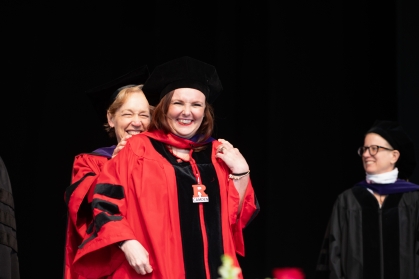Rutgers Law Mom Graduates With Honors and Her Children by Her Side

When Deidra Hopkins walked across the Commencement stage this spring, she wasn't alone—her five young children were right beside her, dressed proudly in Rutgers red. It’s the culmination of three years of hard work and dedication, balancing motherhood, a full-time job, and a demanding part-time law school program (which she finished ahead of schedule, by the way).
Law Adjacent
Hopkins had long been drawn to the law, but life kept putting law school on hold. In her twenties, a serious autoimmune condition meant years in and out of hospitals. Then came a growing family—her husband went back to school, two children arrived, and the couple moved from Canada to Bucks County, Pennsylvania to be closer to relatives.
Because her husband was on a visitor’s visa at the time and unable to work, law school remained a dream just out of reach. Instead, Hopkins stepped into the workforce as a clerk for the Court of Common Pleas in Bucks County. “I knew government work was stable, and I was hoping to carve out a law career in some way,” she says. “I remember walking into the courtroom and thinking, this is where I want to be.”
At the courthouse, Hopkins immersed herself in criminal, family, and civil law, sitting in on hearings, pleas, and trials. After a stretch as a clerical support staffer for a Magisterial District Court judge, Hopkins moved into a new role in the fall of 2020, overseeing the hiring and training of all the county’s judicial clerks and providing support to judges navigating complex legal issues. “Within two years, I realized I still wanted to do more and learn more,” she says.
By 2022, with four kids, a full-time job, and unwavering encouragement from her supportive husband, she knew it was time. “I took the LSAT in January and got into Rutgers Law in April,” she says. “In June, I was starting my first law school class.”
Back to School
Returning to the classroom 13 years after earning her bachelor’s degree—compounded by a full work and home schedule—was no easy task. “I took my first finals living on energy drinks and a prayer,” Hopkins jokes. But, things were about to get even more hectic: not long after finals, she found out she was pregnant with baby number five.

She powered through her second semester while pregnant, then made a bold decision to take maternity leave from work so she could carry a full course load and finish the program early. “I gave birth on Friday, was discharged from the hospital on Sunday, and was in class on Monday,” she says. “For the first three weeks of the semester, my husband would drive me and the baby to campus, my mom would watch the other four, and he’d wait in the lounge so I could nurse during breaks.”
Despite her packed schedule, Hopkins made time to give back. She joined the Volunteer Income Tax Assistance (VITA) program, which offers tax preparation help to low-income families, and is now a student leader for the group. A Social Justice Scholar and Judge James Hunter III Memorial Advanced Appellate Advocacy Board member, Hopkins also participated in the pro bono bankruptcy project, served as a teaching assistant, and competed on the national trial team and intramural mock trial team. All told, she estimates she’s logged around 150 pro bono hours.
Graduating with Honors
On graduation day, she was honored with several distinctions, including the International Academy of Trial Lawyers Student Advocacy Award, the National Association of Women Lawyers Award, the Mary Philbrook Student Public Interest Award, First-Year Writing Award, and the Dean's Pro Bono Publico Award for Exceptional Service, with Distinction. This summer, she’ll be clerking for US District Judge Karen Williams at the federal courthouse in Camden.
For Hopkins, the toughest part of law school hasn’t been the coursework or juggling it with a full-time job—it’s finding balance. “And let me be very clear: I don’t think I’ve found it,” she says. Like many parents, she grapples with “mom guilt,” especially as her husband has taken on the role of primary caregiver. “It can be very hard for me, but there’s a beautiful lesson there, especially for my girls: there’s a time and a season for everything,” she says. “It’s healthy for my kids to see that roles can shift and that families can come together to make sure everyone has what they need.”
And while she hasn’t determined exactly what kind of law she’d like to practice in the future, what she does know is that her graduation day will be a family affair. “My husband and I have asked the kids to really step up and do hard things these last three years,” she says. “It’s made them more independent, and it’s made us stronger as a unit. I hope that, when they’re figuring out their own paths, they’ll remember they can do anything—even when it’s hard. Because this has been hard. But it’s been worth it.”